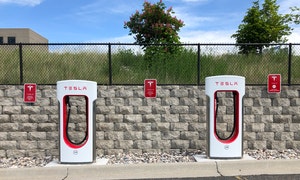Another name of Electric vehicle charging stations is an EV charging station or Electric vehicle charging point. Ev charging points present in private or public places to recharge all-electric vehicles including an electric car, electric bike, etc. Every EV charging point use plugs to charge the vehicles.
People can charge their electric vehicles at their own houses or at on-street while traveling. Depending on the battery capacity and charging power charging speed will vary. At the public places, the charging ports have higher voltage and currents than a residential EV charger. There is fast and efficient charging by using a Direct current (DC) connection.
Types of the electric vehicle charging station
In the world there are EV charging stations in four categories:
Residential charging stations:
An electric vehicle owner can recharge their EV at home. This charging station has no user authentication, no separate metering. With some dedicated circuit and wire, a user can set up a charging station to charge their vehicles overnight. This charging is slow in speed.
Charging while parked:
This can be a private or commercial place for free or paid services. The speed of the charging can be slow or fast. The charging process will be continuing when the owner of an EV is shopping or watching movies while parking his or her car.
Public charging stations:
It provides a fast-charging service. It is capable to supply charge equivalent over 60 miles of range in just 30 minutes. For long-distance travel or in metropolitan cities an owner can charge their EV in a very short time.
Different charging levels
The society of automotive engineering (SAE) declares the general physics, electric communication, and performance requirements for every electric vehicle charging system in North America. So, there are three levels of charging based on the supplied power, voltage, and current.
Level 1:
Outlets voltage: 120 V
Maximum current: 12 to 15 A
Maximum power: 1.44 KW or 1.92 KW
Time is taken to full charge: Long time
It has EV's on-board charger
Level 1 is not used in a country where the voltage is 220 to 240V.
Level 2:
Outlets voltage: 240 V
Maximum current: 80 A
Maximum power: 1.92 KW
Time is taken to full charge: 4 to 10 hours
It has EV's on-board charger
Every country with a 240 V electric supply can use level 2 charging.
Level 3:
It has no EV's on-board charger
Outlet voltage: 500 to 1000 V
Maximum power: 400 KW
Time is taken to full charge: 60 to 75 minutes
So, DC voltage directly to the battery of EV by using Dc connectors.
Different Modes of Charging
- Mode 1 - slow charging from the normal (single or three-phase) electrical socket
- Mode 2 - slow charging from the normal socket with specific protection arrangement
- Mode 3 - slow or fast charging with multi-pin with control and protection function
- Mode 4 - Fast charging with special technology like CHAdeMO
Plug types
There are four types of plugs to use in EV charging stations -
- Single-phase coupler - Type 1
- Single or three-phase coupler - Type 2
- Single or three-phase coupler with safety shutters - Type 3
- Fast DC charging coupler - Type 4
Electric vehicle charging stations in India
Here we provide all live locations of electric vehicle charge stations in Metropolitan cities -
Electric vehicle charging station in Kolkata
EV charging stations in Mumbai
Delhi Electric vehicle charging stations
Bangalore EV charging stations
Electric vehicle charging station requirement in India
All PCI (public charging infrastructure) shall have these following minimum requirements:
- Three fast chargers: a CCS, a CHAdeMo and a Type-2 AC
CCS (combine charging system) - min 50 KW with a rated voltage of 200 to 1000 V
CHAdeMo - min 50 KW with a rated voltage of 200 to 1000 V
Type-2 AC - min 22 KW with a rated voltage of 380 to 480 V
2. Adequate space for entry and exit of vehicles and also for charging
3. An exclusive transformer with all rated substation equipment and safety appliances
4. Line/cables of 33/11 KV including metering
In every Ev charging station has two types of safety sensor:
- Current sensors
- Physical sensor wires









12 Comments
Very nice
ReplyDeleteThis one is really great 👍
ReplyDeleteWow! Thank you for helping us know about such vital updates that we are completely unaware of! Keep it up and keep going!
ReplyDeleteThank you so so much :)
DeleteThank you
ReplyDeleteGreat 👌
ReplyDeleteThank you so much
DeleteGreat going 😊
ReplyDeleteThank you so much
DeleteThanks for sharing Electric vehicle charging stations details with all of us.
ReplyDeleteGreat information has been shared. keep updating. Find the best ev charging station app in near by your location. also keep posting this great article.
ReplyDeleteThanks for sharing informative information. If anyone looking Electric vehicle charging station in India visit Charzer.
ReplyDeleteThank you for your feedback